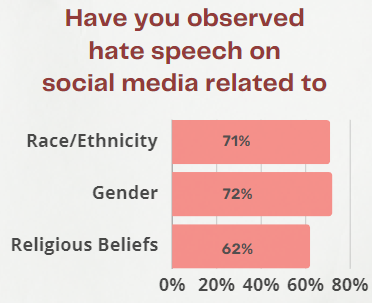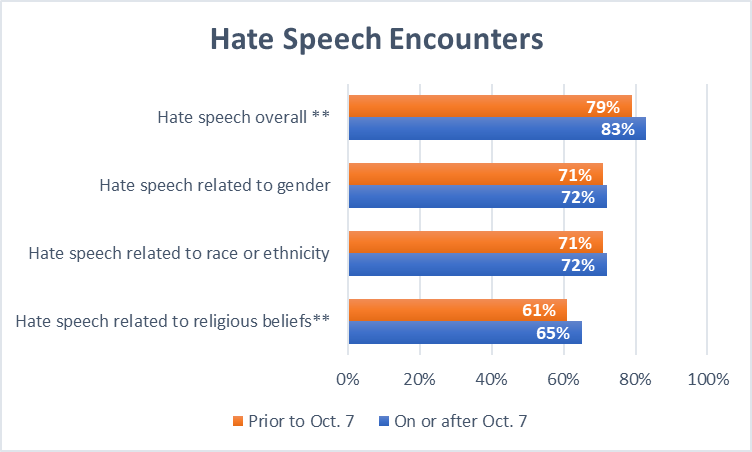According to a 2023 study conducted by the Anti-Defamation League (ADL), 52% of Americans have experienced harassment on social media. Perhaps even more troubling, we know that children and teens are witnessing hate on social platforms at similar rates. The ADL reports that 51% of teens have experienced harassment on social media in the past 12 months, and in our own 2023 survey of over 14,000 American children between the ages of 10 and 18, 80% reported encountering hate speech in the prior month.
Through the Social Media and the Spread of Hate (SMASH) study, we aim to better understand how teens and tweens experience, interpret, and process the hateful content that they encounter on social media. Our team is composed of scholars from UCLA’s School of Education and Information Studies in collaboration with researchers and educators at the Organization for Social Media Safety (OFSMS), a non-profit organization dedicated to making social media safer for everyone. To accomplish this urgent goal, OFSMS offers educational programming to caregivers, educators, and fifth through twelfth graders across the US. Students learn concrete strategies to stay safe on social media and anonymously share their own social media experiences during interactive assemblies using digital handheld devices. Data we collect include their daily social media usage, experiences with cyberbullying, and encounters with hate speech via social media.[1]
aim to better understand how teens and tweens experience, interpret, and process the hateful content that they encounter on social media. Our team is composed of scholars from UCLA’s School of Education and Information Studies in collaboration with researchers and educators at the Organization for Social Media Safety (OFSMS), a non-profit organization dedicated to making social media safer for everyone. To accomplish this urgent goal, OFSMS offers educational programming to caregivers, educators, and fifth through twelfth graders across the US. Students learn concrete strategies to stay safe on social media and anonymously share their own social media experiences during interactive assemblies using digital handheld devices. Data we collect include their daily social media usage, experiences with cyberbullying, and encounters with hate speech via social media.[1]
During the first year of our study (February – December 2023), we gathered data from 14,969 students at 74 schools across six states, mainly concentrated in California. Roughly sixty percent were middle schoolers (i.e., in grades 6-8). Overall, we found that eight in ten youth (80%) reported encountering hate speech in the prior month via social media, with a majority viewing hate speech related to race/ethnicity (71%), gender (72%), and/or religious beliefs (62%).
Our findings appear to be interwoven with the broader tapestry of worldwide events. Looking at these same data, we found a statistically significant increase in reported hate speech roughly two months following the October 7th Hamas attack in Israel and the subsequent Israeli invasion of Gaza (see Table 1). We also found a statistically significant increase in exposure to hate speech related to religious beliefs. Other changes in exposure were not statistically significant. We are continuing to collect data and monitor trends. Table 1. Reported Hate Speech Encounters on Social Media (Before and After October 7, 2023
Table 1. Reported Hate Speech Encounters on Social Media (Before and After October 7, 2023
Note: ** indicates significance at .001
To be clear, we cannot necessarily attribute the increase in student-reported hate speech encounters to recent events in the Middle East. However, our results help to highlight the distressing number of young people who may encounter hateful content on social media, sounding a clear alarm. Study results also provide vital information to schools about their students’ social media habits and exposure to harms. Encouragingly, however, OFSMS is using these results to enhance their social media safety programming, and we are excited to continue working to translate our findings into concrete change.
[1] Topics such as cyberbullying and hate speech are defined for students by OFSMS presenters prior to asking questions about their own experience. Hate speech is defined as “any form of expression through which speakers intend to vilify, humiliate, or incite hatred against a group or class of person on the basis of race, religion, skin color, sexual identity, gender identity, ethnicity, disability or national origin.”
